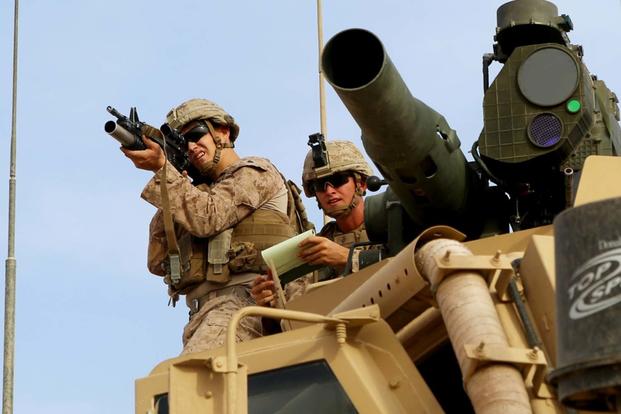The commander of Marine units across the Middle East sees opportunities for the Corps to take on more missions in the region that would typically be tasks for special operations forces.
In a recent interview with Military.com, Lt. Gen. William Beydler, commander of Marine Corps Central Command, said there were multiple traditional special operations mission sets that competent Marines could take on, freeing up the forces for more specialized undertakings.
"I'm not for a moment suggesting that Marine capabilities and SOF capabilities are the same, that's not my point, but I do think, and I think that SOF would agree, that some of the missions they're executing now could be executed by well-trained and disciplined general purpose forces like U.S. Marines," Beydler said.
Marines maintain a constant presence in the Middle East between Special Purpose Marine Air-Ground Task Force Crisis Response-Central Command, a roughly 2,300-man unit that operates across six Middle Eastern countries with an emphasis on supporting the fight against the Islamic State in Iraq and Syria, or ISIS.
They also operate consistently in the region off amphibious ships attached to Marine Expeditionary Units, or MEUs, that routinely provide presence in the Persian Gulf.
Beydler, who assumed the command in October 2015, said these Marines could take on quick-response force operations, security missions, maritime and land raids, and ship visit-board-search-seizure operations, all of which Marines train to do as part of the MEU pre-deployment workup.
"There's a range of things Marines are especially well trained to do -- they can offer up capabilities that might free SOF forces to do other things," Beydler said. "We're not trying to encroach on what they do, but we think that we can be better utilized at times and free them up to do even more than SOF does right now."
Beydler said the Marine Corps was already stepping into some of these roles, though he demurred from specifics.
In one instance that may illustrate this utilization of conventional troops, Reuters reported in May that "a very small number" of U.S. forces were deployed into Yemen to provide intelligence support in response to a United Arab Emirates request for aid in the country's fight against Al Qaida in the Arabian Peninsula.
While the Defense Department did not identify the service to which these troops belonged, officials told Reuters that the amphibious assault ship Boxer -- part of the deployed 13th MEU -- had been positioned off the coast of Yemen to provide medical facilities as needed.
In a January fragmentary order, Marine Corps Commandant Gen. Robert Neller emphasized his desire to see Marines operate more closely with SOF troops and develop a deeply collaborative working relationship.
To this end, six-man special operations forces liaison elements, or SOFLEs, began to deploy with MEUs in 2015 to improve communication between Marines and SOF forces downrange and coordinate efforts. Beydler said professional rapport had increased as a result of these small liaison teams.
"A part of this is again developing professional relationships, developing professional respect and having SOF appreciate that which Marines can do," he said.
Currently, he said, the Marine Corps is considering creating SOFLEs for the Marines' land-based Middle East task force. While there is no timeline to test out the creation of new liaison elements, Beydler said the unit informally looks for opportunities to coordinate with special ops in this fashion.
"I think that we've valued the SOFLEs at the MEU level," he said. "We'll continue to work with SOF to see if we can't have more of these liaisons, more of those touch points."
-- Hope Hodge Seck can be reached at hope.seck@military.com. Follow her on Twitter at @HopeSeck.




























